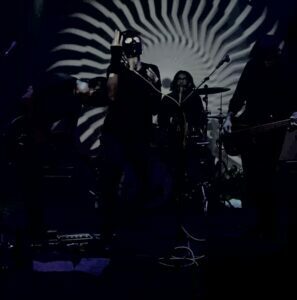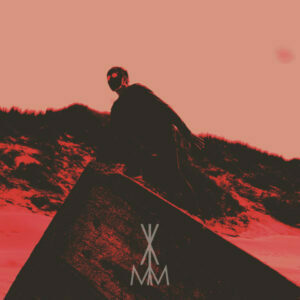XIIIIIIII, the last of an 18 EPs series, was the first work of Vlimmer that we listened to. At the moment, I thought that I was arriving late to the work of this “darkwave” project, but it was just part of the beginning of a long and productive journey along the margins of conventional music. We have talked with Alexander Leonard Donat, restless, eclectic and prolific musician, father of numerous projects that, with this interview, we invite you to discover. He has just released Menschenleere, the second album of this fascinating adventure called Vlimmer.
 —Your father and grandfather were classical musicians and also you have been educated that way. Do you think classical music has influenced your work? Maybe in the way you create atmospheres or the way you treat the textures?
—Your father and grandfather were classical musicians and also you have been educated that way. Do you think classical music has influenced your work? Maybe in the way you create atmospheres or the way you treat the textures?
—I’ve been asking myself a similar question for at least a decade now. Where’s my love for atmospheric and thick walls of sound coming from? In my parents’ house there was only classical music or the news coming out of the radios that were scattered all over the place. And when it wasn’t the radio, it was my father who played his piano in an emotional way, full of verve, always with at least a hint of melancholy. When he put on certain vinyl records or CDs with moving, dramatic orchestral pieces I got goosebumps and felt like the orchestra was surrounding me and I was trapped inside of a musical storm. It’s a little like the shoegaze genre, where guitars are imitating huge soundwave orchestras. Mixed with distortion, the textures create something that feels like heaven for me.
—You got into pop music with the soundtrack of Teenage Mutant Ninja Turtles 2 (sorry I had to do this question). That’s quite an original piece of music to get into popular culture. Do you think it has an influence in your way of seeing pop music?
—“But you DO know that this cassette contains music, it’s NOT an audio book, okay?”, I still remember the exact words of my parents when I held the Turtles 2 OST tape under their noses. Really, I can’t describe why it had such an impact on me, maybe it was just the right mix of childhood hero fanboy-ism, cool cover art and catchy tunes. The tape contains a couple of songs where the chorus is repeated too many times while the drum patterns within the respective songs barely changed. I don’t know how big of an impact it had on how I see pop music. I soak in influences from all kinds of music genres, I’ve never been a clean one-genre type of guy. As long as it touches my head and heart, I don’t care if it’s a 13-minute black metal track or a three-and-a-half-minute pop song.
—Your first band was Jet Pilot, and with them you recorded a full album. The band was originally an alternative rock band that thanks to you became more hardcore. Was hardcore an important music for you in your beginnings? Do you think it’s an influence that can be still traced in your music?
—That’s an interesting question. When I joined the band after they fired their singer, I implemented occasional screaming and shouting like Chino Moreno from Deftones. When I discovered Converge, it became more screaming in our rehearsal space with every passing month until we had songs where I wasn’t singing at all, more spitting out words, sarcastic stories and rants about society. I was very much influenced by the humor of the Scottish noise rock band mclusky, rather than hardcore as a genre. It was more the emo and emo-core genres and bands like Jimmy Eat World and Thursday that I fell in love in the mid-noughties. Today, it’s probably difficult to trace the emotional hardcore influences in any of my projects. My latest one, ASSASSUN, probably comes closest to it vocal-wise. In Vlimmer I sometimes still use the same screaming technique, when I create apocalyptic soundscapes, it’s more in the background, and you can only hear it when you listen closely. Admittedly, to me, it always sounded more like piercing black metal than modern hardcore, which is something I wasn’t too happy about back then – but, hey! It was all about being in a band.
—Next it’s your own project Leonard Las Vegas. I am curious about the name, where does it come from? In this band you added your shoegaze influences right?
—Leonard Las Vegas was my first solo project, I started it without any knowledge of how to play a guitar, yet I knew I had to play it in order to create the shoegaze sound I wanted to achieve. For the first couple of songs I had the guitarist of another indie rock band I was in play the guitar. It sounded fabulous, and motivated me to learn at least some basic techniques of how to play the instrument so that I wouldn’t have to rely on anyone else when I felt like recording music. Recording at home was and is the most convenient way, I can record songs in as many portions and parts as I need, which is useful when it comes to difficult parts that I could never play on stage in front of an audience. In the end, and with all the time that’s passed I probably wouldn’t describe Leonard Las Vegas as a shoegaze band anymore. It’s an indie rock project with dreampop guitars. The name is the result of me trying to add something to my middle name, Leonard, that sounded like a super hero, and not like the music that I actually created.
—Those Leonard Las Vegas albums were recorded in a studio called Flying Icarus Attack. Was the name a wordplay with the British band Flying Saucer Attack? You are also a fan of the creators of Further. What do you like of them? Their textures?
—Well, you kind of caught me in the act, ha, no one ever asked me about this. There never was a real studio, it was just my bedroom, a laptop and an audio interface I plugged my instruments into. The name is a blend of two of my favourite bands, Flying Saucer Attack and The Icarus Line. Further, the second album of FSA, was my first album by them if I remember correctly. Damn, I still absolutely adore the harsh lo-fi vibe, the uncompromising fuzz, the heavy distortion, and the washed out guitar textures. Their first self-titled album is one of my all-time favourites LPs.
—What was wrong with the album Jagmoor Cynewulf, Leonard Las Vegas’ 2014 album? Why do you think it did not reach more people? It came with a book, right? The lyrics from Vlimmer are taken from this book. Can you please tell us more about the content? It’s he story of a young man getting lost between reality and his increasingly delusional mind, right?
—I guess I simply put too many expectations into the making of the Jagmoor Cynewulf album. Also, it was created during a period of time where I still had the dream of making music for a living. It’s super catchy, my way of combining the sounds I love with radio-friendly songs without feeling like a sell-out. At least a handful of the dozen songs the album contains would have fit in just fine in pop radio programs. Why didn’t it reach an audience? I have no idea. I hired a promotional agency, I formed a touring band, I toured all over Germany, I even was one of the winners of a renowned talent price, but maybe it wasn’t the right time and I didn’t know the right people. Even today I’m proud of what I created, but I moved on and don’t won’t to waste my precious time on this planet thinking about past creations.
The book that came with the album was the foundation of all lyrics of Vlimmer’s 18-EP series. When I decided to sing in German, I knew the narrative would make a good fit, as it felt like a dark ambient album poured into words. In parts it describes how I felt as someone who was in-between something: social groups, music genres, goals in life. Would I become a teacher or a professional musician? Heck, those were troubling times, but I always believed that somehow everything would turn out fine. In the book however, Jagmoor remains stuck between reality and delusion. Even after what looks like his death, you’ll find implications of a never-ending cycle he can’t get out of. I’m not religious, but it does resemble certain ideas of purgatory that I encountered during university.
—You wanted Vlimmer to be a bleak version of shoegaze, as you said. What appeals to you of the genre?
—Shoegaze in its most original sense and definition contains distortion and thick walls of sounds that bury the listener, which leads us back to the first question of this interview. When I recognized that shoegaze, sadly, also is a genre that does not offer many variations I needed something harder, bleaker, more disturbing – but I couldn’t find it, Bandcamp didn’t exist back then, so I had to create it on my own. It’s almost absurd, the album that came closest to my idea of bleak shoegaze was a terrifyingly intense atmospheric black metal album by Xasthur called Subliminal Genocide, a pitch-black masterpiece with super atmospheric, distorted guitars. I can still feel the influence when listening to Vlimmer songs like “Schimmer”, “Verankerung” and “Verschiebung” from my first two EPs, I and II.
—You said that Vlimmer was born out of frustration. Do you think that’s the reason the music is darker than previous projects?
—Oh, that definitely is the case. In general, I am a very positive and optimistic person, yet still I’ve got a longing for the dark in my body and head that can fully take over when listening to music. It’s a kind of weird joy that sad, melancholic, depressing music makes me whole. Getting lost in music might even be a valid purpose of life in my opinion, and if I’m lucky it includes cathartic moments that cleanse the soul.
—One of the influences of the EPs is krautrock. Are you interested in the original artists or is it just an influence that you got from modern bands?
—Modern bands and new albums have always had a much bigger impact on me than music from when I was just a kid learning how to walk in the 80s or even before that. Listening to some of the original artists like Neu!, Can and Amon Düül is nice, but never satisfied me as much as newer outfits like Belong, War On Drugs, Lorelle Meets The Obsolete, 10000 Russos or AUA.
—How would you describe the musical journey of the 18 EPs? Which are your favorite ones?
—Nice, I’ve always hoped I’d be forced to answers this question one day. It’s a really tough one as I see a fluid development in the identity of Vlimmer during the course of the 18 EPs. In the beginning there really was this vibe of dark krautrock with the strictly motoric drum patterns. I didn’t use any cymbals, on purpose, as I tried to create something that would just float without any distractions coming from a hi-hat or something. It was all about a hypnotic maelstrom that aimed at the listeners getting sucked into the music. With “X” it felt like a change, I partly gave in to the positive reviews that were hearing a The Cure influence which was actually only the result of me experimenting with my voice. All of a sudden, I had established a strange connection to what I read about Vlimmer on music websites and blogs. There were so many bands I’d never even heard of, bands I mostly didn’t even check out. But here’s the fun part: I began to write songs that were some kind of soundtrack for the reviews of already released Vlimmer EPs. I wanted it to sound like what the writers were describing when they were covering Vlimmer. All of a sudden, I created goth/darkwave music without really knowing what these genres sounded like. And to make it absolutely clear: I never intended to sound like an 80s band, but that probably happens automatically when you work with an 80/90s Technics keyboard and its soundbank.
Anyways, if I had to choose just three EPs, I would pick X (part 10), XIII (13) and XIIIIIIII (18) as I love how they include catchy apocalyptic post-punk as well as heavy darkgaze monsters, some of which include black metal screaming deep in the mix.
—Was it easy to do different things with each EP or did you have any moment that you thought that you were repeating yourself?
—I would lie if I said that I never tried repeating myself when certain songs were more popular than others. But it’s almost hilarious, even if I wanted to, I never managed to create the same vibe all over which, in the end, created a totally unique song without any bigger sisters or brothers. Writing the songs was easy, and it naturally developed in new directions without any further ado. The hardest part is the final mixing process which was super stressful and annoying on a regular basis.
—Why the wrong Roman numbers to name the EPs?
—To annoy the listeners. From the beginning I set this goal to release 18 EPs, and I was already giggling beforehand thinking about people trying to decipher which number “IIIIIIIIIIIIIIIIII” would be. Let me save you some time, it’s the final part. But when I reached more and more listeners, much more than I could dream of, I decided to call part ten “X” in order to help them a little. A rare case of a correct Roman number in this series, yes, yes. Hey, did you know that “IIII” is actually an acceptable alternative for “IV”? I didn’t.
—What do you think are the main difference between the EPs and the Nebenkörper album? You said that it has more tribal drums and at the same time it was less 80s.
—Before starting the recordings for the first album I had this very clear vision of a tribal drum basis for the songs. To me they have this haunting, ritual touch, and combined with the most apocalyptic synth sounds that I could find it couldn’t get any darker. At the same time, I ditched the 80s vibe that I found in almost all reviews about the last third of the EP series. Ultimately, I wanted to surprise and challenge my listeners and myself with a very different, almost brutal album. Side note: Although ready for the recordings, in January 2021 I was still waiting for the arrival of the brand-new Arturia Polybrute which was constantly postponed. I couldn’t fully start the album’s sessions without it, so I recorded drums for songs which barely had any riffs or melodies, it was kind of funny. What a relief when the postman brought me the Polybrute!
—With the release of the first Vlimmer songs, you got into the “Goth scene”. You said that you did not know darkwave or even bands like Clan of Xymox. Have you become more interested lately in the genre?
—It’s still difficult for me to listen to music from before the time I got interested in alternative music scenes. 90% of all music I buy is released in the year I purchase it. Sure, music is timeless in many ways and Clan of Xymox still release music, but when I checked out one or two of their songs I didn’t feel like, “hey, I need more of that”. Sadly, I have the strange sensation that almost all bands which are labelled “darkwave” use the same synth sounds and drum machines which results in the umpteenth version of “just another darkwave band”. What I’d like, though, is a massive darkwave influence mixing with other genres. Gimme some black metal darkwave!
—You said that cinema influences you. Any movie that has inspired a Vlimmer track?
—Not that I remember. To no one’s surprise I’m more of a person who prefers series over movies. The intro of “Stranger Things” had a big influence on Vlimmer during the making of the IIIII EP, and some frightening tribal track that was played during the end credits of, I think, “The Fall”?, a crime series, had me rush down to my cellar studio immediately recording “Sonnenschwarz” which is still one of my favourite Vlimmer tracks. I think that may have been the first time, I recognized how much I liked the sound of toms
 —You tried to play the songs of Vlimmer with only piano and vocal with the help of your Father. What happened with this project?
—You tried to play the songs of Vlimmer with only piano and vocal with the help of your Father. What happened with this project?
—The first Vlimmer song with only my voice and a piano was a re-interpretation of one of the songs from the II EP. I choose “Pianist” (hah, well, with THAT title, how could I chose another song?), and it sounded nice. The Vlimmer with the hands of Oceaneer EP was recorded shortly after, no beats, just a lonely creaking piano and my vocals drowning in reverb. Back then I was much more into ambient than I am these days, which may change, of course; so it felt like a natural thing to do. One or two years later I started recording ten reinterpretations of Vlimmer classics with my father. He is a professional pianist, and it was amazing to see how he listened to my electronic compositions turning them into piano pieces in no time. The songs are all pretty much finished on my computer, I just haven’t felt like the time was right for it. It will happen, though, I’m sure.
—Let’s move now to your other side projects: at the same time that you create Vlimmer, you have recorded the first Fir Cone Children album, something more punk/shoegaze. You have said that you focus on the experience your daughters make. So basically, what do you aim with this project?
—I have a knack for fast shoegaze songs, but most of them are rather mid-tempo’ed, so it seemed logical to start a punk band with shoegaze guitars. The lo-fi touch, the childish and naive way of playing a noisy guitar, it felf like children’s music for children who don’t like children’s music. Fir Cone Children are a musical diary for my two daughters. Once a year I look back on the things they experienced and create an album. The songs are either written from my perspective or theirs. It was fun pretending to write lyrics from the view of a one-yea-old. Now my first daughter is experiencing her first waves of puberty, things are getting a little more complex lyric-wise …
—That same year you also recorded an album as Feverdreamt, done for your father-in-law with a more oriental vibe. Instead, what was the motivation for the second one?
—Here my aim was to combine Oriental/Arabian/Yiddish-style chord progressions with krautrock. And to show my father-in-law that I could record an album like that in a week. The music I created was partly jammed, and I recorded the guitar and my voice at the same time, something I had never done before. As it didn’t fit to my other projects, I had to start yet another one, Feverdreamt. I’m immensely proud of the second album, Melantant, which is way more electronic, but it seemed like I smothered listeners with the sheer amount of ideas and sounds, they barely had a chance to listen to this dystopic one hour trip and fully digest it, hah!
—Distance Dealer is a synth/goth project with Thiago Desant. How was this project born? Is it difficult to work with someone living on a different continent?
—On my label I released three albums by Thiago’s alter ego, Phantoms vs Fire, which is an amazing synthwave/experimental/ambient project. He never really sings on his tracks, but some instrumentals sounded like they were calling for vocals. So I approached him, “Do you wanna make dark pop music with me?” It took just two or so days and I had the first instrumental in my inbox. And no, it’s not difficult at all to make music with someone who lives far, far away when you have a clear vision of what you want to create. In general, during the song writing process we didn’t risk anything, and there were no crude experiments although we both like trying out new stuff. However, in this case, to be honest, I think we just did what we’re good at and combined it. The pieces fit.
—Under your own name, Leonard Donat, you released an album entitled Deer Traps in a darker ambient style. Is it easy to create more experimental tracks or more song-based one for you?
—It really depends on my mood. None is more difficult than the other, but maybe the song-based tracks make me think more analytically while making them, while I love to just drown in the experimental tracks, giving them all the time they need until they possess my whole body. Deer Traps was about mantra-like repetition and creating a vortex of twilight.
 —And what about WHOLE? This is more of a band with whom you do concerts, right?
—And what about WHOLE? This is more of a band with whom you do concerts, right?
—Indeed, it’s the only band I play live with. My bandmate, Thomas, is in charge of mixing, and he’s giving the songs the sound they need, they’re cleaner, tidied up. In 2023 we’re going to release our second album
—The last one of your projects is called ASSASSUN. Did you think that the music of this album did not fit in any of your other projects?
—That’s an interesting question. I do see the resemblance with Vlimmer sound-wise, but the vocals are something I had never done before, The way I sing, shout and bark did not feel like Vlimmer, and the arrangements are much sparser here, it really is just a drum machine, a synth and my vocals. Everything has a much colder and desperate vibe, while Vlimmer has this melancholic side.
—How is your label, Blackjack Illuminist going? Any future release that you can tell us about?
—So far, we have albums by Fir Cone Children (30 September) and Vlimmer (4 November) and maybe Leonard Donat coming in late 2022 or early 2023. Anyways, next year it’s time for Feu Follet and WHOLE, and I really hope my fellow New Zealand friends from Social Union will finish an album.
—You do the artwork of your albums and also of all the special editions. How important is the DIY culture for you? Do you think it would be better if more artists followed your example or does it take too much time?
—The DIY culture had and will always have a massive impact on how my label works, it probably is THE whole idea behind it. Doing everything on your own, from the songwriting process, the recording and mixing process, to the artwork, burning CDs, dubbing tapes, ordering vinyl and doing the promotion for the final product, is a LOT of work which is usually shared by at least four to five people, but it also is really rewarding for yourself. I’ve learned so much about all the things mentioned above, and it showed me that we all – no matter if professional or not – have to fight with the same problems and doubts, it’s simple, yet striking, everybody puts his pants on the same way. During the past 15 years I’ve met so many great people (most of them online from all over the world), and I wouldn’t want to miss being in touch with them – and there’s always new folks and new opportunities. Yes, I’d definitely recommend artists doing stuff on their own, but I guess it depends on what type of artist you are. I’ve not met too many musicians who also do their own artwork, and I can understand why, as it’s a component that doesn’t have to anything do with the music itself besides creating fitting images. As much as I sometimes think that I’d be nice to give things out of my hands, I value the spontaneity that comes with the DIY style. Instead of planning months ahead, I can follow my guts and release something within under a week.
—You say that you listen to a lot of different genres, any artist that has blown your mind lately?
—King Gizzard and the Lizard Wizard were the latest band that really blew my mind. Their whole psychedelic universe is so vast, they just record and record, release and release and never seem to stop, and they try out new things all the time – and they don’t give a damn about expectations. Okay, the latter is just me guessing. Anyways, I don’t think I have ever bought more records of any band in such a short period of time ever before than with King Gizz when I discovered them two years ago.
—What can you please tell us of Vlimmer’s second album, recently released? How much different is compared to the first one? You said that it’s catchier, less aggressive and menacing.
—Yes, these adjectives can still be applied to the new album. Menschenleere contains 11 tracks, and the tracks are more song oriented. Overall, it’s more diverse, while the claustrophobia of the entire Nebenkörper album was fully intended, for the new one I wanted to combine different styles and moods and also give the listeners a chance to breathe. On the one hand it’s a blend of industrial, post-punk, wave and indie rock, which shouldn’t surprise anyone familiar with Vlimmer, but this time around I incorporated some of the spirit of the final quarter of the EP series, and my vocals are not buried in the atmospheric sound designs, they are more distinguishable. It feels a bit risky to release this after Nebenkörper, to be honest, but what would an album be for an artist if it was just a copy of what was before? Let’s keep me challenged with my own doubts.



